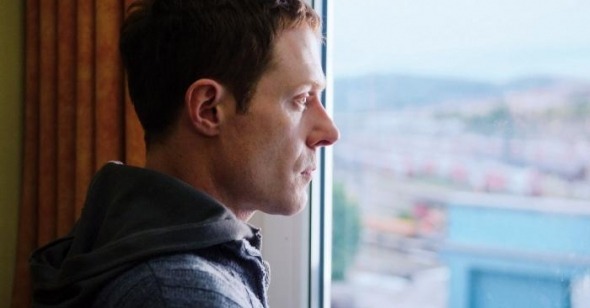Run for Your Life
by Benjamin Mercer
The Robber
Dir. Benjamin Heisenberg, Austria, Kino International
The protagonist of the Austrian film The Robber, the based-on-a-true-story first feature by Benjamin Heisenberg (yes, of those Heisenbergs), does two things, and pretty much two things only: he runs long distances and he robs banks. The nearest thing to a straight explanation we get for why Johann Rettenberger (Andreas Lust) so compulsively does the latter—with a latex mask, a shotgun, and an empty gym bag, and sometimes using a radio-blasting stolen car as a getaway vehicle, but just as often relying on his own two feet—comes when he gets home from a particularly long day of marathon training and sticking up strip-mall bank branches. He downloads the information from the heart monitor that has been strapped to his chest to his computer; an enormous spike appears right in the middle of the graph. Johann, an ex-con with no occupation (he tells his parole officer he’s unable to find work that fits around his training schedule), is nonetheless too compulsive and reckless for his robberies to just be about the money; the heart-rate graph confirms the robbing as a pure adrenaline rush, a physical addiction, a way of bringing his body up against its absolute limit. He also appears to enjoy flouting social conventions of less consequence (he bypasses a post-movie traffic jam by driving right through the middle of a small park), so we can surmise that he likely carries out his transgressive behavior without a hint of guilt.
Befitting its protagonist’s addiction to putting himself in danger (shades of The Hurt Locker), The Robber is a truly visceral piece of cinema, its many marathon scenes and chase sequences legitimately pulse-pounding. But The Robber’s surface similarities to the interior redemption narrative Revanche—which starred Lust, often seen jogging through wooded areas, and had a plot that hinged on a Vienna bank hold-up—point up the newer film’s weaknesses as a human drama. For while Heisenberg often admirably refrains from over-psychologizing his protagonist, some of his lean 96-minute film’s concessions to love-against-all-odds romantic tragedy—Johann is ultimately redeemed (slightly) by his love for a good woman, Erika (Franziska Weisz), a friend from before his time in prison—ring false. Part of the problem with this relationship angle: all along it’s easier to accept that the blank-faced Johann sleeps with Erika—who offers him a room in her rather luxurious apartment, an upgrade over the parolee’s rail-terminus studio that seems to please him—just to get his heart pumping than it is to believe he genuinely cares for her, something that he attempts to demonstrate only in the film’s closing moments.
Johann’s solitary internal combustion, however, is far more interesting than his sole meaningful relationship (though the suggestion that this tight-lipped athlete has a backstory involving her does prove consistently intriguing). He lives a monastic life—he eats, sleeps, runs, and repeats, ducking conversation with others, most notably his parole officer—that also includes criminal activity (bank robberies, fleeing from authorities, and attempted prison escapes) and cheap-thrills pop detritus (in the getaway cars he repeatedly turns the volume up and the radio dial as far right as possible; he sees some blow-’em-up multiplex fare with Erika, which puts a knowing smile on his face). Heisenberg also underscores his main character’s status as a walking contradiction by giving him two prominent public identities: he appears on the local news both as the inspiringly reformed fresh-out-of-the-clink athlete who wins the Vienna City Marathon, setting a new national record, and in radio reports and newspaper surveillance-photo spreads as the masked menace ripping off the city’s banks at an alarming clip. Eventually it becomes clear to the police and residents of Vienna that these are two sides of the same man, and the film culminates in a dazzling manhunt sequence that shows Johann coming gradually closer to the end of his tether. When his car grinds to a halt during this chase, so does the film, suggesting, finally, in an almost tongue-in-cheek fashion, a one-to-one relationship between the protagonist and film itself, a medium premised on forward motion (of narrative, of the film through the projector), often using breathtaking technique for rather lurid ends.
The Robber is a rare urban survival story less preoccupied with social issues than the human body and its physical limits; it’s a portrait of a man who thrives on backing himself into a corner and then bursting forth from it, an almost direct inversion of the more typical man-against-the-elements story, in which the hero encounters trouble seeking out a remote natural expanse. As Johann’s early record-setting performance in the “city marathon” emphasizes, Vienna is his territory, his racecourse, and his eventual slowdown is partly brought about by his refusal to operate outside its limits (to flee) or even its rhythm (to slow down, to lay low). The fantastically nimble The Robber imagines a man in a kind of parasitic relationship to the city in which he lives, a self-destructive movement addict who gets his blood pumping by navigating crowded alleys and arteries as his life-or-death escape routes.
